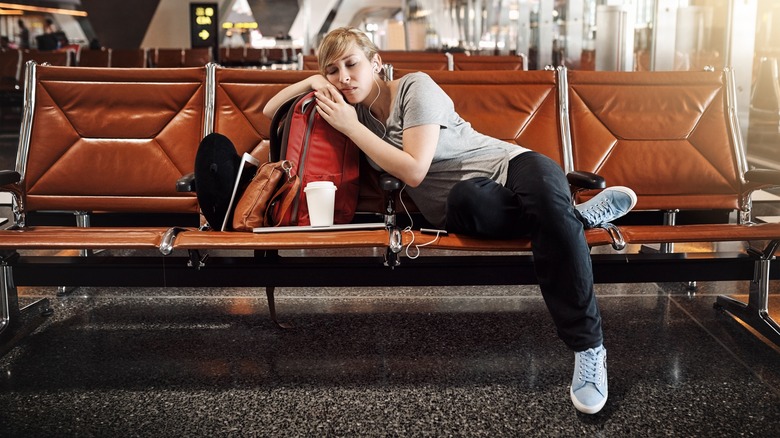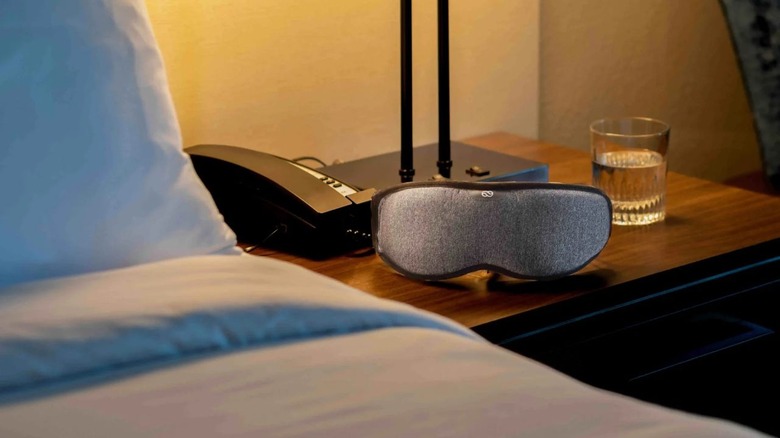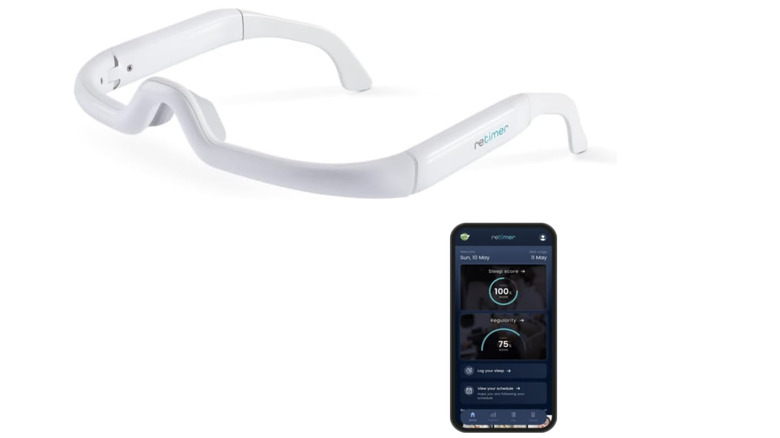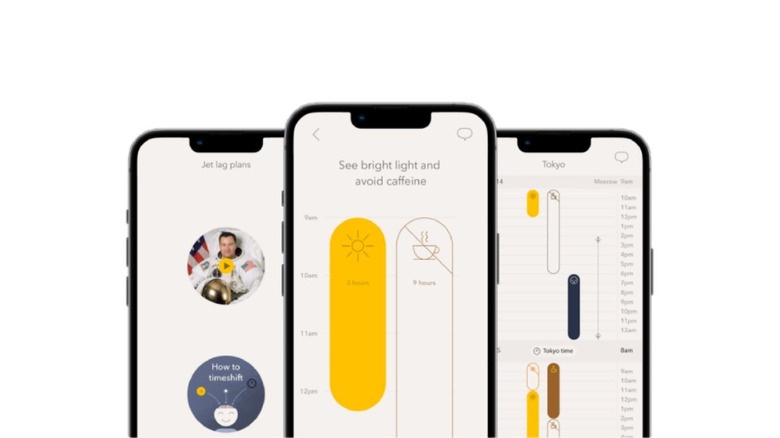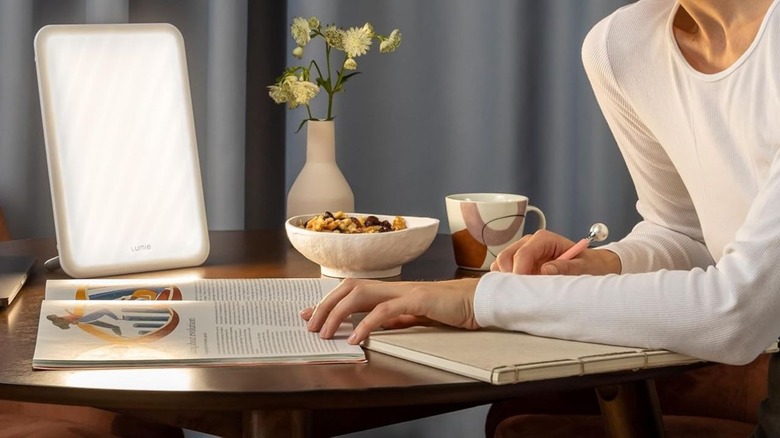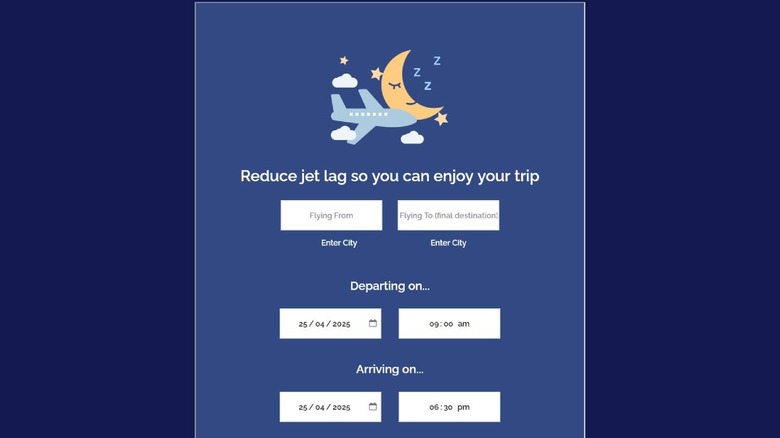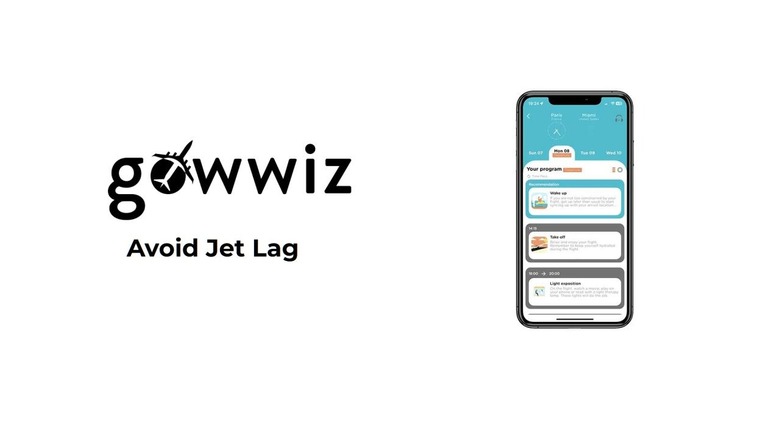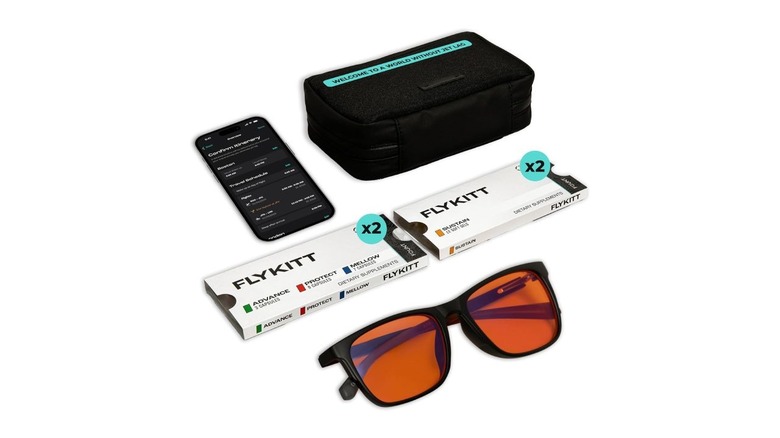7 Useful Apps & Tech That Can Help You Combat Jet Lag
We may receive a commission on purchases made from links.
No one likes to get jet lag, especially as vacations keep getting shorter and drowsiness takes over more and more of the trip. That also rules out slower ways of traveling that don't move at jet speed. Not everyone is so affected by jet lag that they limit the kind of trips they'll go on, but according to a survey, the problem might affect as many as one in five Americans. The fear, if not the effects, of jet lag can be so severe that it brings potential travelers to abandon the trip of their dreams. Of course, since jet lag gets worse the farther away you travel, international vacations are more problematic than domestic flights.
It's impossible to say how you, specifically, can fight jet lag, but there are a few apps and gadgets that promise to help you put an end to this particular kind of travel fatigue. Some try to trick your body into adapting to the new time zone with a sequence of actions like taking naps and eating "special meals," while others rely only on a precise sleep schedule. All of them, however, are trying to do the same thing: slowly pushing your internal clock's hands back or forward to match your destination, one minute at a time so as not to cause any stress or sickness — a sickness you know of as jet lag.
Lumos Mask
Not to be confused with the magic spell you can launch on your iPhone or the related Google Assistant easter egg, the Lumos is a smart sleep mask that promises to do a lot more than just beat jet lag, including strengthening your sleep pattern and adjusting to daylight saving. That said, jet lag is one of the most appreciated of Lumos' stated goals. In one of the very few reviews available for this gadget, tech media publication CNET tested the Lumos Mask as a cure for jet lag and came away fully satisfied. That's encouraging to any prospective buyer, but one positive review doesn't make a consensus. The lack of user reviews on any website except Lumos' is another bad sign.
We didn't test this sleep mask either, so we can only encourage you to do the necessary research before trusting the efficacy claims made by the company. Those claims, to be fair, are not hard to trust. Like many other sleeping aids, which every jet lag solution boils down to in the end, Lumos attempts to shift the brain's perception of the 24-hour day cycle called the circadian rhythm. It approaches this in two ways at once: First, it asks you to follow a sleeping schedule based on your wakeup time, thanks to a proprietary app. You can use this app to adapt to a new time zone. Second, it sends brief flashes of light through your eyelids while you're sleeping. According to the website's Science page, this can influence the production of melatonin and other hormones, shifting the circadian rhythm.
Retimer
There's no way around it: The Retimer 3 doesn't look like a device anyone would want to wear. A smart sleep mask like the Lumos flashes your eyelids with random bolts of light while you sleep; that sounds unpleasant already. Now, imagine if that happened while you're awake, wearing what looks like Spy Kids-branded toy goggles, all the way into the airport. But what if that was the secret to beating jet lag? Would you be willing to give them a chance? Retimer is a company involved in the business of light therapy glasses, and in the last few years it's become very popular with users. Wake up early and use the Retimer to advance your circadian rhythm, promises the company. Do the opposite, and you will delay your internal clock.
Just like a smart sleep mask, those glasses are supposed to be accompanied by a stable sleep schedule and regular use. That's why this product comes with an app that tells you when to go to sleep and when to use the Retimer. But that's true of most light therapy glasses. Why should you go with the Retimer? One possible reason is that this company managed to feature their glasses in a number of scientific papers. Are those papers any good? It's hard to say. However, user and professional reviews are generally positive. That's already an achievement of sorts: Many of Retimer's peers struggle to be at the center of any online discussion, let alone a good review.
Timeshifter
With over 3,000 reviews between Google Play and Apple's App Store and an average of 4.7 out of five stars, Timeshifter is one of the most well-liked apps for traveling long distances without suffering from jet lag. Although it's marketed to shift workers and everyone else suffering from sleep issues, one of its main functions (and by far the one most often discussed online) is fighting jet lag. The website has even registered a trademark on "The Jet Lag App." Unsurprisingly, the theory behind Timeshifter is nothing new. By deciding when you go to sleep, wear sunglasses and/or a sleep mask, and (optionally) take melatonin, this app promises to refocus the circadian rhythm on the desired sleep schedule.
It's not surprising that so many proposed solutions to jet lag focus on the circadian rhythm. Plenty of things can influence your sleep schedule, from using your phone in bed to (reportedly) sleeping under a full moon. But while installing wellness apps or leaving the phone away at night can get you better sleep, they can't get rid of jet lag. Timeshifter and other apps like it can be useful because they implement solutions you wouldn't otherwise think of. Are you really going to wear shades before bedtime, now that you know they can improve sleeping? Probably not. Timeshifter promises to tell you when to do so, and then force you to wear those sunglasses with the unique strength of a notification from an app you paid for.
Lumie Light
The Lumie light isn't just for jet lag. That's not even the primary reason it exists; that would be fighting seasonal depression. According to Lumie, the company that makes those lamp/alarm clock hybrids, waking up to a slowly brightening light helps you "feel energized, refreshed, and ready to take on the day." What does that have to do with jet lag? Why, it's all connected to our good friend, the circadian rhythm. Lumie has spent decades in the business of using light to adjust users' internal day-night clock with special lights. They might have started with wake-up lights and solutions to seasonal affective disorder, but it's clear that the company considers jet lag an important market.
For those looking to fight jet lag with soft lights and a new sleep schedule, Lumie suggests the Vitamin L portable light. This lamp doesn't have any functionalities dedicated to curing jet lag, but it's one of the most portable lights made by the company. This time, there's no app for shifting the circadian cycle, but Lumie explains how to do this yourself. It's relatively affordable, too — not when compared to a regular light, but it's cheaper than most light therapy glasses and smart sleep masks. Lumie's products might sound a little weird and their promises of waking you with a color-shifting lightbulb insincere, but they're a solid company with loyal customers and plenty of reviews in large publications.
Jet Lag Rooster
Jet Lag Rooster is a simple and free website and web app that gives surprisingly complex results. It's part of Sleepopolis, a website dedicated to improving your sleep and maybe selling you on a premium mattress and other bedroom gadgets to fall asleep while you're there. Jet Lag Rooster (also called Jet Lag Calculator, although parts of the original name remain on its own web page) isn't the focus of much online discussion, the only exception being the fact that roosters can get jet lag. The calculator was featured by the BBC's travel features division back in 2013, and that's just about it.
That said, the web page makes no outlandish claims or says anything to warrant more than a common, healthy dose of skepticism. It's a sleep scheduler like many others. It even uses the same kind of guidelines employed by some academic institutions. Input your travel data — time and place of departure and arrival, how long you have to prepare, if you're willing to take melatonin — and the website gives you a sleep schedule to follow that will gradually adjust your circadian rhythm. You can decide whether to start adjusting your sleeping times before departure day and for how long, learn if you should sleep on the plane, and receive suggestions for when to take in some light and when to avoid it.
Gowwiz
Gowwiz is a simple app for iOS and Android that is focused sharply on helping you fight jet lag. How it does this shouldn't be a surprise by now. It uses a customized calendar that adjusts sleep time to help the body's circadian rhythm adapt to the day/night cycle of the new time zone. And while the company's website says that the main way to do this is by regulating sleep and light intake, the app includes other activities that it says might help, like eating "special meals" and taking naps. It also includes the option of reminding you of daily medical treatments, which is exactly the sort of thing you'd forget about during a long trip across time zones.
To make the app's setup simpler, Gowwiz can automatically build your itinerary by reading your flight number and identifying your plane. However, it can't do this with complex trips, like those that rely on connections. Those have to be programmed manually. There isn't a lot more to Gowwiz than this, but maybe you don't need more. The basic app is free, or at least its most basic functions are. Those include the Jet Lag Program, but only for the flight day and the previous day, and the medication reminder. Trying to enable any other option in-app reveals that access to the premium app is $5.99 for one month or $16.99 for a whole year; a little cheaper than its direct competitor, Timeshifter, which costs $9.99 per "plan" or $24.99 a year.
Flykitt Jet Lag Prevention System
The Flykitt Jet Lag Prevention System is the weirdest of all the tech solutions to jet lag we could find, excluding those experimental circadian implants that aren't commercially available yet. At $99.99 for a round trip, the Flykitt is easily the most expensive solution we could find. However, one feature makes it stick out from the rest. The Flykitt comes in a package. Along with the circadian rhythm app we all know and expect, this kit features supplements with names like Mellow and Advance, and a pair of blue light-blocking sunglasses that you're supposed to wear indoors. Unsurprisingly, lots of people reflexively call this a scam. However, Flykitt has received a significant amount of coverage from large publications, some of which tried the products and were entirely happy with the results.
Users seem to really like it as well, though they point out that the most important and impressive part of the package is the planning app that tells you when to sleep and when to eat. That's exactly what the websites and apps we looked at before do, and those are nowhere close to $99.99 for a single trip. You could consider the supplements the icing on the cake, but those are not unique either. You can easily buy melatonin and vitamins yourself, including in jet lag-themed packages. It's hard to say if the app does something better than the competition or if the supplements are a special blend with unique properties without more information from the company. For now, we can only suggest you proceed with caution, considering the price of this product.
